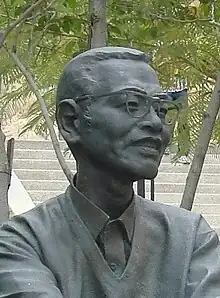
In number theory, Chen's theorem states that every sufficiently large even number can be written as the sum of either two primes, or a prime and a semiprime (the product of two primes).
It is a weakened form of Goldbach's conjecture, which states that every even number is the sum of two primes.
History
The theorem was first stated by Chinese mathematician Chen Jingrun in 1966,[1] with further details of the proof in 1973.[2] His original proof was much simplified by P. M. Ross in 1975.[3] Chen's theorem is a giant step towards the Goldbach's conjecture, and a remarkable result of the sieve methods.
Chen's theorem represents the strengthening of a previous result due to Alfréd Rényi, who in 1947 had shown there exists a finite K such that any even number can be written as the sum of a prime number and the product of at most K primes.[4][5]
Variations
Chen's 1973 paper stated two results with nearly identical proofs.[2]: 158 His Theorem I, on the Goldbach conjecture, was stated above. His Theorem II is a result on the twin prime conjecture. It states that if h is a positive even integer, there are infinitely many primes p such that p + h is either prime or the product of two primes.
Ying Chun Cai proved the following in 2002:[6]
Tomohiro Yamada claimed a proof of the following explicit version of Chen's theorem in 2015:[7]
In 2022, Matteo Bordignon implies there are gaps in Yamada's proof, which Bordignon overcomes in his PhD. thesis.[8]
References
Citations
- ↑ Chen, J.R. (1966). "On the representation of a large even integer as the sum of a prime and the product of at most two primes". Kexue Tongbao. 11 (9): 385–386.
- 1 2 Chen, J.R. (1973). "On the representation of a larger even integer as the sum of a prime and the product of at most two primes". Sci. Sinica. 16: 157–176.
- ↑ Ross, P.M. (1975). "On Chen's theorem that each large even number has the form (p1+p2) or (p1+p2p3)". J. London Math. Soc. Series 2. 10, 4 (4): 500–506. doi:10.1112/jlms/s2-10.4.500.
- ↑ University of St Andrews - Alfréd Rényi
- ↑ Rényi, A. A. (1948). "On the representation of an even number as the sum of a prime and an almost prime". Izvestiya Akademii Nauk SSSR Seriya Matematicheskaya (in Russian). 12: 57–78.
- ↑ Cai, Y.C. (2002). "Chen's Theorem with Small Primes". Acta Mathematica Sinica. 18 (3): 597–604. doi:10.1007/s101140200168. S2CID 121177443.
- ↑ Yamada, Tomohiro (2015-11-11). "Explicit Chen's theorem". arXiv:1511.03409 [math.NT].
- ↑ Bordignon, Matteo (2022-02-08). "An Explict Version of Chen's Theorem". Bulletin of the Australian Mathematical Society. Cambridge University Press (CUP). 105 (2): 344–346. arXiv:2207.09452. doi:10.1017/s0004972721001301. ISSN 0004-9727.
Books
- Nathanson, Melvyn B. (1996). Additive Number Theory: the Classical Bases. Graduate Texts in Mathematics. Vol. 164. Springer-Verlag. ISBN 0-387-94656-X. Chapter 10.
- Wang, Yuan (1984). Goldbach conjecture. World Scientific. ISBN 9971-966-09-3.
External links
- Jean-Claude Evard, Almost twin primes and Chen's theorem
- Weisstein, Eric W. "Chen's Theorem". MathWorld.